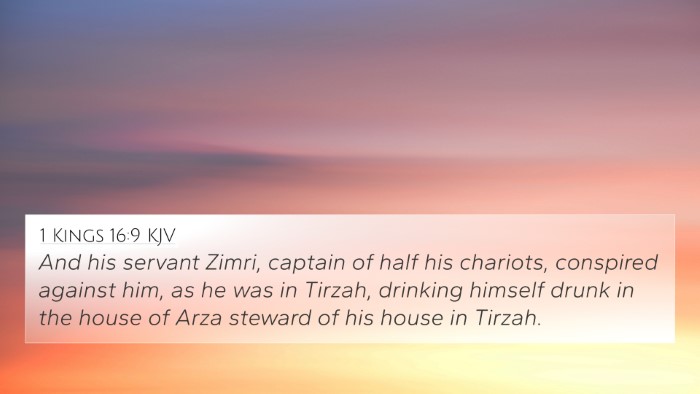Understanding 2 Kings 15:10
Bible Verse: 2 Kings 15:10: "And Shallum the son of Jabesh conspired against him, and smote him before the people, and reigned in his stead." This verse narrates a pivotal moment in the narrative of the kings of Israel, marking a significant shift in leadership through conspiracy and murder.
Contextual Overview
This chapter in 2 Kings deals with the tumultuous history of Israel's kings, revealing the instability and violence that characterized the northern kingdom. Shallum’s rise to power is reflective of the broader theme of treachery and the quest for authority that permeates much of the historical accounts in 1 and 2 Kings.
Commentary Insights
-
Matthew Henry:
Henry emphasizes the rapid change of power and the violent means through which it is often acquired. Shallum's act of conspiracy embodies the corrupting nature of ambition and the tragic consequences that unfold as a result of turning against rightful authority.
-
Albert Barnes:
Barnes notes the significance of the sins of Israel's leaders, suggesting that Shallum's actions mirror the disobedience and chaos among the people. The verse illustrates not just a change in leadership, but also a societal failure where power struggles lead to suffering.
-
Adam Clarke:
Clarke provides a historical lens, commenting on the implications of Shallum's reign, foreshadowing the eventual downfall of Israel. His perspective contributes to understanding how such acts of violence contribute to the cycle of retribution and decline prevalent in this era.
Thematic Connections
The themes of betrayal, ambition, and God’s sovereignty resonate throughout this verse. The act of killing the king, Zecariah, can be compared to similar events in the histories of other leaders, which helps in illustrating the overarching message of moral decay leading to divine judgment.
Cross-References
- 1 Kings 16:8-10: The story of Zimri, who similarly conspired against and killed King Elah.
- 2 Kings 10:1-11: The narrative of Jehu's coup against Jezebel and the house of Ahab.
- Jeremiah 22:15-17: A warning against the practices of downfall inherent in the pursuit of wealth and power.
- Proverbs 29:2: “When the righteous are in authority, the people rejoice: but when the wicked beareth rule, the people mourn.”
- Matthew 27:24-26: Pilate's symbolic washing of hands in relation to the death of Jesus, paralleling themes of innocent bloodshed.
- Luke 22:48: Judas’s betrayal of Jesus presenting another embodiment of treachery in leadership.
- Isaiah 9:16: “For the leaders of this people cause them to err; and they that are led of them are destroyed.”
Lessons and Applications
2 Kings 15:10 serves as a stark reminder of the consequences of betrayal and the nature of human ambition. Today, readers might reflect on the moral implications behind leadership choices and the importance of integrity in positions of power.
Cross-Referencing for Deeper Understanding
For those seeking to explore the connections between Bible verses and their themes, tools for Bible cross-referencing can provide depth to this study. Understanding how to utilize a Bible concordance or a cross-reference Bible study guide can illuminate the intricate linkages across the scriptures, highlighting the broader narrative and thematic cohesion within biblical texts.
Conclusion
By examining key verses and employing methods of cross-referencing, one can uncover the profound lessons embedded in scripture. The events of 2 Kings 15:10 not only recount a historical event but also call us to examine our values and responses to authority within our own lives.











